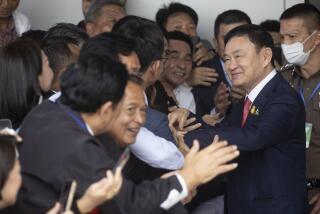Ne Win, 91; President Bankrupted Myanmar, Enriched Self
Ne Win, a reclusive, eccentric general whose ruthless rule bankrupted Burma economically and spiritually during his 26 years in power, died this morning at age 91 in Yangon, members of his family said.
Burma, which changed its name to Myanmar in 1989, paid dearly for the socialistic, xenophobic policies of Ne Win’s reign. Once seen as potentially the richest county in Southeast Asia, it became the poorest. Human rights were routinely abused, corruption was rampant and individual freedoms were nonexistent.
Ne Win, who took power in a 1962 coup, kept his officer corps loyal over the decades with large cash grants, often deposited in Swiss bank accounts. He also provided well for himself and his family -- he married seven times, twice to the same woman -- with a fortune estimated at $4 billion and properties in Austria and Germany.
He died at his lakeside villa, where he had been under house arrest with his daughter since March, when three grandsons and a son-in-law were arrested on charges of trying to overthrow the military government.
Ne Win had such faith in astrology and superstition that mysticism became part of national policy. He introduced 45- and 90-kyat notes to the currency because he believed nine was a lucky number and the numerals in each added up to nine. He once ordered his ministers to eat mohingka, a poor man’s dish of fish and noodles, for three days to ward off national poverty.
In France for a state visit in 1984, he abruptly went home when a member of his entourage had a motorcycle accident, believing it a bad omen. At various times in Rangoon (now Yangon), the capital, he was seen dressed as a king in one working-class district and walking backward over a bridge at night -- apparently following the advice of soothsayers who remained close advisors throughout his life.
Ne Win, born Shu Maung in the town of Paungbe on May 14, 1911, dropped out of the University of Rangoon in 1932 and began his working life as a postal clerk. Later he became associated with Aung San, the leader of Burma’s independence struggle against Britain, and in 1940 was one of 30 nationalists sent to Japan for military training.
He took the name Ne Win (“Bright Son”) there and became a commander in the Japanese-sponsored Burma National Army, which in 1945 switched to the Allied side as Japan’s defeat in World War II became imminent. By the nation’s independence in 1948, he was Burma’s second-highest-ranking officer. Fourteen years later, as commander-in-chief, he led the coup that overthrew Burma’s democratically elected government.
Ne Win’s ruling revolutionary council was known as the Burma Socialist Program Party, and his ideology was something he called the Burmese Way to Socialism -- a rigid Stalinist blueprint that closed Burma to outsiders, put absolute power in the hands of the military and shut down all avenues of free expression.
Under Ne Win, a country rich in timber, oil, natural gas, gems and minerals became poorer and poorer and eventually had to apply to the United Nations for “least developed status.”
The Burmese -- who now number 50 million -- never loved the president they called “the Old Man,” but they didn’t exactly hate him either. He was a godfather, unpredictable and frightening, but he could make poor men rich and change national policy on a dime -- as he did overnight once, ordering everyone to start driving on the right side of the road, instead of the left, on the advice of a wizard.
He resigned as president in 1981 but maintained power as party chief. He warned his colleagues the day he resigned: “Though I will not be in the parliament ... I shall be watching from the party, and when I give advice where needed, do things with discretion. I shall continue to do things, but all those who would be directly concerned with the practical aspects of the work should exercise utmost caution.”
Seven years later, he stunned the country by resigning as party chairman in the midst of pro-democracy student protests that claimed 3,000 lives at the hands of the army. He took “indirect” responsibility for the unrest but said that if the military had to be called in again to quell demonstrations, there would be no warning shots.
Despite his “retirement” from politics, Ne Win continued to quietly influence Burmese events until his death, manipulating the juntas that followed his rule. They paid lip service to the return of multi-party democracy, but that goal remained elusive, even after Myanmar’s leading opposition figure, Aung San Suu Kyi, won the Nobel Peace Prize in 1991.
Ne Win ended his life as a recluse, holed up for months and years at a time in the heavily guarded lakeside home. Between 1989 and September 1997, when he traveled to Jakarta to meet with his friend Indonesian President Suharto, he was not seen in public.
More to Read
Sign up for Essential California
The most important California stories and recommendations in your inbox every morning.
You may occasionally receive promotional content from the Los Angeles Times.










